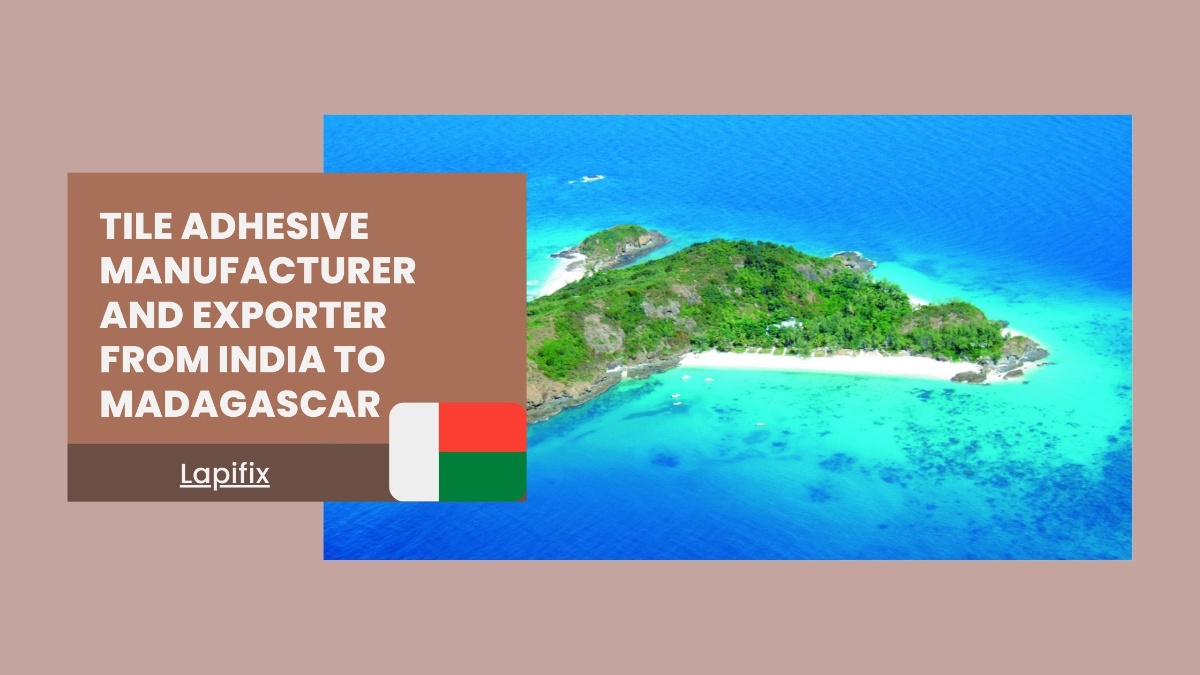


The construction and renovation industry of Madagascar is booming, especially brand-new hotels rising up in Antananarivo and modern block apartments. The massive construction and renovation industry is replacing the old traditional apartments and individual houses across the island on a large scale. The construction sector in Bal Wise, Asia is developing at a rapid rate as builders are doing not only commercial, but residential work as well, hence the need to access high performance, and quality building materials such as tile adhesive.
India, which holds the reputation of producing tile adhesives superior in quality at a reasonable cost to the rest of the world, has become a major importer to the Madagascan business persons and contractors as well. However, when there are dozens of suppliers available in the market, it might not be very easy to find the way to the appropriate tile adhesive exporter between India and Madagascar.
Why Indian tile adhesive is trusted worldwide
Which adhesive types best suit different projects
How Madagascar’s market shapes buying decisions
How to verify reputable exporters
What the shipping and compliance process looks like
Real success stories
And practical tips to avoid common mistakes
Whether you’re a construction manager, building supplier, or a local distributor in Madagascar, you’ll find everything you need to make confident, profitable buying decisions.
Indian tile adhesive has earned global trust for four main reasons: quality, affordability, consistency, and adaptability. Major Indian manufacturers produce adhesives that comply with international standards like ISO, BIS (Bureau of Indian Standards), and even green building certifications.
High Bond Strength: Indian adhesives are very strong glues to tiles, even when used in humid environments.
Versatility: Products can be applied to ceramic, porcelain, vitrified and natural stone tiles.
Cost Efficiency: India is a very huge producer, therefore its prices are also quite affordable yet of good quality.
Custom Solutions: Most exporters supply province special blends to cope with the climate of Madagascar and constructions.
This balance between quality and price is enjoyed by large housing development firms, hotels, retail stores, and infrastructure construction firms in Madagascar. Indian exporters are a no brainier with reliable supply chains, large capacity of production and flexibility of shipping options.
Choosing the right type of tile adhesive is essential for a successful project. India’s top manufacturers export a variety of adhesives to Madagascar, each with specific properties:
These are water mixed powdered adhesives. They are inexpensive and easy to apply and they therefore work well with normal ceramic or porcelain tiles on the floors and on the walls.
Common uses:
Indoor floor and wall tiling
Residential and small commercial projects
These have some added polymers to enhance flexibility and sticking. It is an ideal product in challenging locations such as bathrooms, kitchens and outside walls where tiles are exposed to moisture and fluctuations in temperature.
Common uses:
Wet areas (bathrooms, pools)
Large format tiles
Tiles on wood or plywood substrates
There are paste adhesives which come premixed and make the process of installing small tiling jobs or doing a DIY job easy.
Common uses:
Small renovations
DIY market
Wall tiles with light loads
The epoxy-based adhesives form the ultimate with high-performance and high strength chemical resistance, as well as, durability. These are applicable in hospitals, factories, industrial floors and commercial kitchens where sanitation and durability are a must.
Common uses:
Industrial floors
High-traffic commercial spaces
Chemical processing areas
Many exporters sell adhesives with grouts or waterproofing compounds or additives that contractors often find more convenient to use.
Madagascar’s tile adhesive market is shaped by its:
Climate: The coastal areas are high humidity conditions, which may influence the bonding in case of the improper usage of the adhesive, also tropical rain can influence the bonding.
Urbanization: The cities such as Antananarivo and Toamasina are spreading and the number of people in need of adhesive products, especially the cheap and durable adhesives, is growing.
Construction Boom: Hotels, commercial spaces, government infrastructure, and modern housing are all fueling the surge.
Import Dependence: Madagascar imports nearly all the building materials, even the adhesives, hence dependability and efficiency in shipping are the key factors.
Builders, architects, hardware retailers, and distributors are the main buyers. They prioritize:
Consistent supply
Competitive pricing
Reliable performance under local conditions
With hundreds of options in India, how do you know which exporter to trust?
The best exporters share a few common traits:
Recognized Brands: They have a solid relationship with renowned manufacturing companies that have BIS and ISO accreditation.
Proven Export Experience: They already supply products and services to the African market and the Indian Ocean.
Strong References: They are able to give actual case studies, testimonies, or lists of clients.
Complete Solutions: Some give the package of adhesives, grouts, and technical support.
These may be big chemical firms, special adhesive factories and well known B2B-export houses registered with the Engineering Export Promotion Council (EEPC) or the Federation of Indian Export Organisations (FIEO) in India.
Ask them to give you company profiles, export and buyer feedback. Always good exporters love to hear success stories.
Lapifix is an Indian tile adhesive brand whose quality of production can be deemed as supreme among its peers, the consistency and reliability of exports is another great quality making it the brand to buy when you want superior tile adhesive.
Lapifix with its consistent performance over the years has established its reputation in the Indian market and globally in countries such as Madagascar and produced high-performance products of tile adhesives that are of international standards. The product range that the brand offers strictly addresses the requirements of the tropical, humid, and coastal construction markets- it is simply tailor-made to the expansion of infrastructure in Africa.
|
Feature |
Lapifix Advantage |
|
Product Quality |
BIS / ISO Certified, polymer-based |
|
Export Logistics |
Madagascar shipping expertise |
|
Technical Support |
Pre- and post-sale consultation |
|
Customization |
Bulk, OEM & private label options |
|
International Compliance |
TDS, MSDS, COO, and HS Code 3506.91 |
Choosing an exporter based on price alone is risky. Use this checklist:
Check Legal Compliance: Make sure the exporter is in possession of valid export licenses and is or has the knowledge to adhere to the norms of the DGFT (Directorate General of Foreign Trade) of India.
Look for Certifications: ISO 9001 standard or BIS standards or environmental certificate increases the level of trust.
Ask for Product Samples: It is best to always test and ask sample of the adhesive quality before making bulk purchases.
Review References: If genuine exporters, they will be able to give contacts of previous buyers in Madagascar or other markets of the same.
Negotiate Clear Terms: Establish minimum order quantity (MOQ), mode of payment, mode of packaging, schedule of deliveries and incoterms (FOB or CIF).
Visit or Inspect: Many serious importers visit the factory or hire local inspection agents for large shipments.With large amount of imports, many serious importers will visit the factory; or employ local inspection agents.
Understanding the logistics helps avoid hidden delays or costs. Here’s how a typical shipment works:
Product Selection & Quote: Importer discusses adhesive type, volume, price, and delivery terms.importer negotiates about adhesive type, volume, price and delivery conditions.
Sample Approval: Buyer tests samples to verify quality.
Proforma Invoice & Contract: Exporter provides an elaborate quote including HS codes, mode of shipping and inconveniences.
Production & Packing: goods are manufactured (in case of not ready stock), packed safely, and labeled according to the BIS and international standards.
Customs Clearance in India: Exporter submits the shipping bills, pays duties (when they exist), obtains Bill of Lading.
Freight & Insurance: The cargo is to be delivered through sea freight (or air conveyance of urgent minor consignment). Insurance insures transit risks.
Madagascar Customs Clearance: Imports fill in paperwork, clear inbound duties, and must arrange inland deliveries to the ultimate location.
When you have a good freight forwarder and a customs broker, this whole process would become so easy.
Both India and Madagascar have specific requirements:
Certificates of Origin: Confirms goods come from India.
BIS or ISO Certifications: Proves the product meets quality standards.
Fumigation/ISPM 15: May be required for wooden pallets.
Import Permits: Madagascar buyers must ensure their paperwork is current.
Third-Party Inspections: Some importers hire SGS or Bureau Veritas to verify shipments before loading.
Many Indian exporters are modernizing production to meet global sustainability goals:
Low VOC & Non-Toxic: Eco-friendly adhesives reduce indoor air pollution.
Water-Based Formulas: Less hazardous during installation and usage.
Recyclable Packaging: Reduces the harmful effects on the environment.
Energy-Efficient Production: Certain plants are running on solar energy or recycling waste.
If your project needs LEED or green building certifications, indicate that as early as possibleLEED or green building compliance is available right now in the use of numerous exporters.
Several top brands like MYK LATICRETE, Roff, and Lapifix are known for international exports. The best brand depends on your use case (e.g. waterproof, heavy-duty, fast-setting) and order volume.
The HS Code for tile adhesives is 3506.91, covering prepared glues and other adhesives not elsewhere specified.
The standard sea freight duration is 20 to 30 days, depending on the port of origin in India and logistics coordination.
Yes. Many Indian tile adhesives are designed to withstand tropical, humid, and coastal conditions, offering water resistance and UV stability.
Typically required:
The modern-day highly dynamic construction industry requires sourcing of the right materials- particularly tile adhesives, which can make a huge difference in terms of durability, safety, and other aesthetic factors of a project. Due to the lack of supply, the demand of superior quality performance oriented tile adhesive is fast increasing in the construction sector in Madagascar which is continuously experiencing growth in residential, commercial, and infrastructure projects.
This is where Lapifix comes out as your partner in crime in India.
Lapifix is a highly knowledgeable provider of adhesives to tiles, as well as a highly experienced exporter capturing all the reglementary details of international trade and offering to partners a high value export relationship. Their adhesives come in a solution designed to design according to the conditions of the climate experienced in Madagascar i.e. withstanding of humidity, fast-drying bonding, and a durable substrate on a broad range of surfaces.
Count yourself a tile distributor, construction company, infrastructure developer or importer and you will find in any case and more so having your production needs met by Lapifix, a set of performance, regulatory and logistics that makes it all trouble free, to scale and profitable to count on the adhesive.